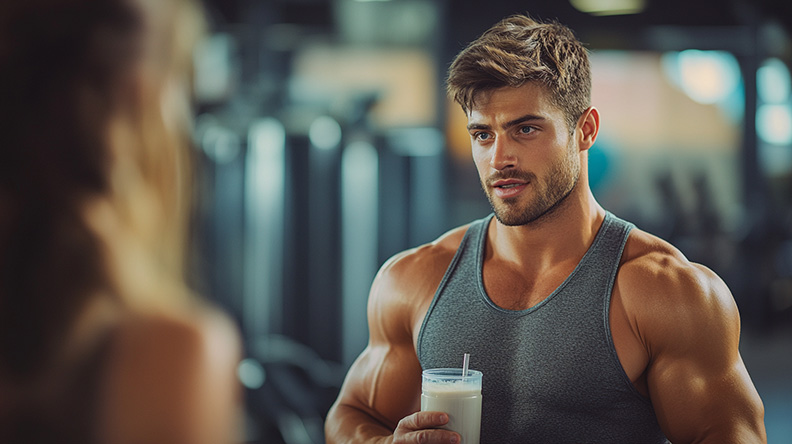The age-old fitness question remains: when’s the best time to eat around your workout? Whether you’re exercising at home with a personal trainer or hitting the gym solo, proper meal timing can make or break your fitness results.
Multiple studies show that strategic eating around exercise affects everything from your energy levels to muscle recovery and weight loss progress. While conventional wisdom often pushes post-workout nutrition, research now suggests the answer isn’t one-size-fits-all.
Your ideal meal timing depends on several factors, including your specific fitness goals, workout intensity, and schedule. Let’s explore the science behind pre and post-workout nutrition to help you optimize your fitness journey.
Should You Eat Before or After Workout to Lose Weight?
If weight loss is your goal, the timing of your meals around workouts becomes even more crucial. Some research suggests that working out on an empty stomach (fasted training) might help burn more fat, especially during morning workouts.
However, it’s not quite that simple. Working out without fuel can also lead to:
- Lower workout intensity
- Decreased performance
- Muscle loss
- Early fatigue
The sweet spot for weight loss often lies in a light pre-workout snack and a balanced post-workout meal. This approach helps:
- Maintain workout intensity
- Preserve muscle mass
- Control post-workout hunger
- Support metabolism
For optimal weight loss results, consider having a small protein-rich snack about 30 minutes before your workout, then eating a balanced meal within 2 hours after exercising. This strategy provides enough energy to power through your training session while still maintaining the caloric deficit needed for weight loss.
Remember, post-workout meals don’t negate your weight loss efforts – they help your body recover and maintain muscle mass, which is crucial for long-term fat loss success.
Should You Eat Before or After Workout to Gain Muscle?
When it comes to building muscle, proper nutrition timing can significantly impact your results. Unlike weight loss goals, muscle gain requires a more aggressive approach to both pre and post-workout nutrition.
Before your workout:
- Eat a substantial meal 2-3 hours before training
- Include complex carbs and protein
- Aim for 300-400 calories
- Stay hydrated
After your workout is when the magic happens. The post-workout “anabolic window” is crucial for muscle growth:
- Eat within 30 minutes of finishing
- Focus on fast-digesting protein and carbs
- Aim for 20-30g of protein
- Include healthy carbs to replenish glycogen
The combination of pre and post-workout nutrition creates an optimal environment for muscle growth by:
- Providing energy for intense training
- Reducing muscle breakdown during exercise
- Increasing protein synthesis
- Supporting recovery and growth
For the best results, work with a certified personal trainer who can help align your nutrition timing with your specific workout program and muscle-building goals.
How Long After Eating Can You Work Out?
The waiting time between eating and exercise depends largely on the size and composition of your meal. Getting this timing right helps prevent discomfort and optimize your workout performance.
When it comes to large meals, you’ll want to wait 2-3 hours before jumping into any significant physical activity. These substantial meals require more digestion time, and exercising too soon could lead to cramping, nausea, or decreased performance – especially during high-intensity workouts.
Light snacks, on the other hand, only require about 30-60 minutes of waiting time. These smaller, easily digestible foods – think simple carbs and lean protein – can serve as perfect pre-workout fuel without weighing you down.
Your body will typically let you know when it’s ready for exercise. The right time to work out is when you no longer feel full, your energy levels are high, and you’re free from any digestive discomfort. At this point, you should feel ready to move without restriction.
Different types of exercise may require different waiting periods. While strength training might be comfortable after 60-90 minutes, cardio or HIIT workouts often need a longer digestive window of 2-3 hours after a large meal. Yoga practitioners should be especially mindful, as inverted positions can be uncomfortable even 1-2 hours after eating.
Everyone’s digestion works differently, and that’s where personalized guidance becomes valuable. Working with a personal trainer can help you determine the optimal meal timing for your unique body and workout style. They can adjust your training schedule to match your eating patterns or help you plan meals around your preferred workout times.
Making Your Workout Nutrition Work for You
The science of workout nutrition continues to evolve, but one thing remains clear: consistency matters more than perfect timing. Rather than stressing over exact meal windows, focus on developing a sustainable routine that fits your lifestyle. If morning workouts on an empty stomach leave you lightheaded, there’s nothing wrong with having a small snack first – even if you’re trying to lose weight.
Consider scheduling a consultation with a certified personal trainer who can evaluate your current eating patterns and exercise routine. They’ll help you identify small, meaningful adjustments that can boost your results without requiring a complete lifestyle overhaul. Sometimes, something as simple as shifting your workout time by 30 minutes can make a significant difference in how you feel and perform.
Remember that nutrition timing is just one piece of your fitness puzzle. The quality of your workouts, consistency of your training, and overall daily nutrition habits play far bigger roles in achieving your goals. Start with whatever timing pattern feels most natural, track how your body responds, and adjust as needed. Your perfect workout nutrition schedule is the one you can maintain long-term.
Want personalized guidance on optimizing your workout nutrition? GYMGUYZ offers both nutrition counseling and personal training services, bringing expert advice directly to your home. Book a consultation to create a personalized plan that fits your schedule, preferences, and goals.



